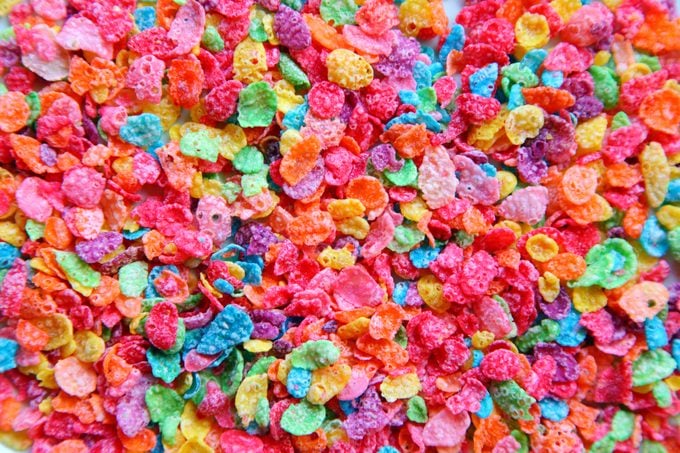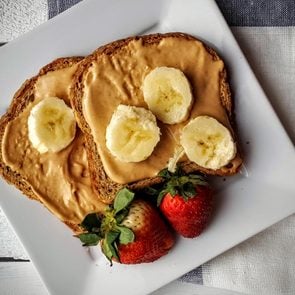Craving Sugar? A Dietitian Says You May Need More of This Surprising Nutrient
Updated: Mar. 13, 2024
When you suddenly need a sugar fix, that urge might feel like it has a hold on you. To help manage sugar cravings, a registered dietitian suggests you may simply need more of this healthy basic in your diet.
Concerned that you eat too much sugar? Your worry may be warranted. Some clinical professionals, like dietitians and physicians, understand that when your blood sugar suddenly rises, your blood actually gets thicker. Over time, this can lead to serious health issues and increase your risk of chronic diseases, such as type 2 diabetes, heart disease, stroke, and obesity.
And, many nutrition professionals teach that sugar from processed foods (unlike healthy carbohydrates, such as sweet potatoes or brown rice) is a drug. This means that by definition, regularly consuming refined sugar typically only leads to more cravings. So to hear the suggestion you should just totally cut out sugar can feel the way someone with clinical depression hears advice to “just be happy.” (If it were only that simple, right?)
If you’ve tried every method you can think of to beat your sugar cravings but still find yourself struggling, one dietitian may have just come to the rescue. Her suggestion? What you actually might need is to add more of something into your diet, rather than totally turning toward cutting the sweet stuff out. We’ve got the scoop. Oh—and if you’ve ever asked why you crave sugary, fatty foods before your period, you may have just found the answer.
How does protein affect blood sugar?
Protein is one of three macronutrients that provide our bodies with calories to supply us with energy. The other two are carbohydrates (commonly known as sugars) and fats, and each of these three affects your blood sugar differently.
Carbs cause your blood sugar levels to rise right after you eat, causing the pancreas to release insulin for transporting the sugar into blood cells. Fats, on the other hand, don’t have an immediate impact on blood sugar…but eating a high-fat meal can slow down your digestion and impair insulin’s ability to transport sugars into your cells.
Protein helps to control blood sugar levels by helping to slow down digestion, increasing satiety (or how full you feel after a meal), and reducing post-meal blood sugar spikes by reducing the rate at which your cells absorb sugar.
So…can protein curb sugar cravings?

As registered dietitian and nutrition writer Brittany Lubeck, MS, RD, tells The Healthy, consuming protein causes the blood sugar from the food you eat to be released into the bloodstream slower than when carbohydrates are eaten alone, or in an extra-large serving. “Eating protein will help stabilize your blood sugar and prevent those dreaded spikes and dips that can cause issues, including sugar cravings,” Lubeck explains.
According to Dr. Dana Ellis Hunnes, PhD, MPH, RD, dietitian and assistant professor with the Fielding School of Public Health at UCLA and Senior Dietitian at the Ronald Reagan UCLA Medical Center, adding more healthy sources of protein to your diet helps to maintain blood sugar stability while slowing down the rate of absorption of starches and carbohydrates in food. “These two mechanisms, blood sugar stability and slowing down the rate of blood sugar absorption, help reduce sugar cravings,” Dr. Ellis Hunnes says.
If you eat protein-rich foods but still find yourself craving the sweet stuff, well, here’s another insight that might make you think differently: as dietitian Lubeck says, “Another common cause of sugar cravings is not eating enough calories, or not eating the right types of foods at meals and snacks. If you eat only simple, refined carbohydrates, your body’s insulin response will be a bit drastic, causing lots of insulin to be secreted from your pancreas.”
However, including a healthy protein along with carbs at meals will help prevent a blood sugar crash that leaves you craving sugar. This is because protein, along with fiber, take longer for your body to digest. This can make you feel fuller longer after meals.
How much protein can help manage sugar cravings?
Wondering how much protein do you need to keep your sugar cravings at bay? As Lubeck explains, the daily requirement varies based on age, gender, weight, and activity level, but a general formula Harvard Medical School offers is to eat 0.36 to 0.45 grams of protein per pound of your body weight.
Another important takeaway, Lubeck says, is to space out your protein intake evenly throughout the day. For example, if your daily requirement is 75 grams of protein, you might consider eating 15 grams over five snacks or meals spaced throughout the day.
Another good way to prevent sugar cravings is to pay close attention to hunger cues, and don’t allow yourself to grow overly hungry. Allowing yourself to reach the point of starving will cause your body to crave simple carbs, as they’re the quickest form of energy. You’re then more likely to give in to temptation and eat processed junk food to satisfy your sugar cravings. Stay one step ahead of cravings by having healthy snacks regularly throughout the day and not allowing huge gaps between mealtimes.
The best protein sources to fight sugar cravings
Consider adding more healthy proteins—including plant-based protein—to your diet, and keep your kitchen stocked. The best protein source to fight sugar cravings might be legumes (think lentils, chickpeas, black beans, tofu, and peas). These are particularly effective at fighting sugar cravings because, unlike meat and dairy, these protein sources deliver the double benefit of protein plus fiber, which also reduces sudden jolts in your blood sugar. (Read more on the best sources of plant-based protein.)
A list of healthy proteins includes:
- Legumes: Lentils, beans, chickpeas, tofu, tempeh, peanuts, green peas.
- Whole grains: Oatmeal, brown rice, wild rice, buckwheat, seitan.
- Nuts and seeds: Quinoa, chia seeds, hemp seeds, almonds, pumpkin seeds.
- Lean grass-fed meat, fish, and dairy: Skinless chicken or turkey, extra-lean ground beef, fish, eggs.
Want more on eating healthier and busting cravings? Sign up for The Healthy‘s daily newsletter. Also, keep reading:
- 7 Genius Nutrition Hacks a Dietitian Just Inspired Us to Try
- Feeling Down? Here’s the Compelling Effect of Your Mental Health on Your Heart Health
- Is Magnesium Glycinate a Sleep Game-Changer? Here’s Why a Dietitian Gives This Supplement a Nod
- 12 Best Small Treadmills for Your Home or Apartment, According to Certified Fitness Experts






















